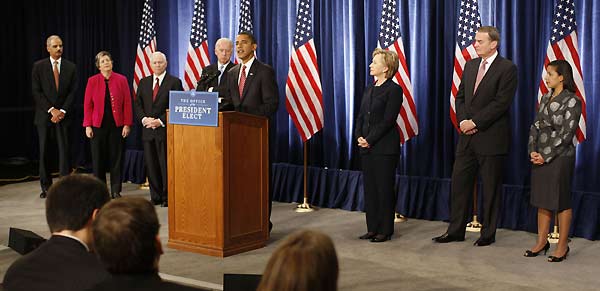Former President Bill Clinton was faced with a sluggish economy when he took office in 1992, but it was a "small deal" compared with what is happening now.
Furthermore, as Obama won the election under the banner of "Change," there are ultra-high expectations for him to quickly reverse the economic slide.
Carter Eskew, a political strategist, said the problem was not whether Obama can make a big change happen, but rather what that big change will be.
Bob Kerrey, a former senator and now an academic, said specific policy proposals by Obama are less important than re-instilling confidence among the American people.
The most important trait for Obama to keep in mind, Kerrey added, was the post-partisan attitude that he adopted during his successful primary and general election races.
What may come as music to Obama's ears is that opinion polls show Americans seem willing to give Obama "the benefit of the doubt" when it comes to the economy.
In a recent Gallup poll, 58 percent of those queried said they would be inclined to support an economic stimulus package proposed by Obama.
The president-elect may also benefit from the sentiment that the current economic woes are the result of bad policies during the Bush Administration rather than the result of anything he will do during the first years of his own presidency, analysts said.
As the economic situation is worsening day by day, most people tend to believe that how Obama responds to the economic crisis will define his presidency and the incoming "Obama era".
A recovery would certainly strengthen his reelection prospects while a prolonged downturn could eventually lead voters to make a second thought about their choice, analysts said.
Terrorism still a top external challenge
 |
|
President-elect Barack Obama takes questions from reporters during a news conference in Chicago, Monday, December 1, 2008, with, from left to right: Attorney General-designate Eric Holder; Homeland Security Secretary-designate Janet Napolitano; Defense Secretary Robert Gates; Vice President-elect Joe Biden; Secretary of State-designate Sen. Hillary Rodham Clinton, D-N.Y.; National Security Adviser-designate Ret. Marine Gen. James Jones; and United Nations Ambassador-designate Susan Rice.[Xinhua/Reuters]
|
Earlier this month, Obama acknowledged that the US national security challenge is as urgent as the financial turmoil.
The recent brutal attacks in Mumbai reinforces the theory that terrorism will still be the United States' top external threat.
Combating terrorism, for Obama, would mean wrapping up the war in Iraq and focusing on Afghanistan.